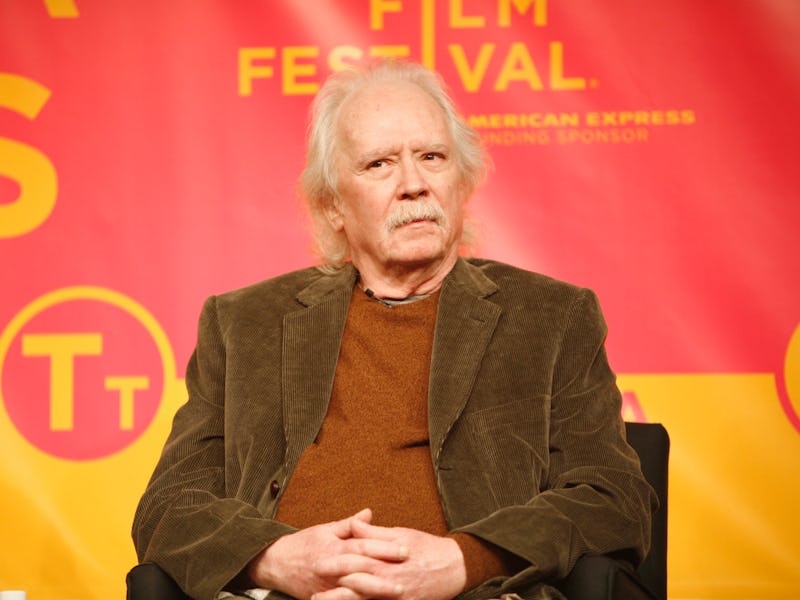Why John Carpenter Returning to 'Halloween' Is Such a Big Deal
Horror fans rejoice, the filmmaker will executive produce a new 'Halloween' sequel with Blumhouse Productions

The tagline to filmmaker John Carpenter’s seminal 1977 horror film Halloween, emblazoned next to a deviously simple and ingenious pumpkin-to-butcher knife poster design, read: “The Night He Came Home.” It was appropriate then, when it referred to the masked killer, Michael Myers, who terrorized the babysitters of the suburban town of Haddonfield, Illinois. But it’s also appropriate now. Only, the “he” in that statement shouldn’t mean Myers anymore; it should refer to the guy who created him. News broke this morning that after 34 years away from the franchise, Carpenter will executive-produce the next Halloween sequel in collaboration with production companies Miramax and Jason Blum’s Blumhouse Productions, alongside longtime series producer Malek Akkad. Halloween is finally coming home.
This is monumental news in horror circles. “I’m going to help to try to make the 10th sequel the scariest of them all,” Carpenter said in a statement from Blumhouse. He’s not only the man who has defined the genre for the latter half of the 20th century with genre classics like The Thing, but he’s also the man responsible for a lot of people getting into horror in the first place. It’s all because of Halloween.
But Carpenter has had a long and strange relationship to the franchise that he and producer Debra Hill created at the tail end of the 1970s along with help from original producer Moustapha Akkad. The first film catapulted both Carpenter and Hill into New Hollywood fame, but the low-budget hit they made was bittersweet. Carpenter and Hill would write and produce the sequel, Halloween II, in 1980, which was directed by first timer Rick Rosenthal and featured a less cerebral and more slasher film aesthetic than the original. The studio was unhappy with Rosenthal’s direction, which the deemed not scary enough, so Carpenter had to leave his own movie The Fog to take over and direct minor reshoots to up the scares.
That sequel was supposed to be the final appearance of the masked killer known as Michael Myers, as the character is blown up by Jamie Lee Curtis’s heroine Laurie Strode in the film’s climax. For the third installment, Carpenter and Hill proposed the nascent idea for a cinematic universe, effectively rebranding the Halloween franchise as a way to tell multiple stories around the spooky holiday to keep the franchise perpetually fresh. But the third movie they produced, Halloween III: Season of the Witch, about an evil toymaker who concocts a mystical plan to kill every child on Earth on Halloween night, perplexed audiences with its anti-capitalist themes. The absence of Myers, who fans expected to show up, didn’t help either.
The film’s failure caused Carpenter and Hill to sign their rights to the franchise away to Akkad, who eventually made a fourth movie that brought Myers back. The movie, appropriately titled Halloween 4: The Return of Michael Myers, marked the beginning of the non-Carpenter era of Halloween movies. Akkad and his son Malek then picked up the mantle for better or worse, effectively driving the franchise into the ground with a series of cheaply made lackluster sequels that nevertheless retain a kitschy quality fans still enjoy. They have attempted to reboot the franchise twice before, with the 1998 meta-sequel Halloween: H20 and a retelling of the original by musician and filmmaker Rob Zombie in 2007. Malek, who fully took over duties from his father who died in 2005, even attempted a third reboot with the recently abandoned and questionably titled Halloween Returns, which collapsed last year after the movie studio lost the rights to the franchise.
This new failure basically paved the way for Carpenter to step in, which makes sense. Carpenter is having a bit of a nostalgic moment. Hes in the middle of a burgeoning music career, having released two recent solo albums of material titled Lost Themes and Lost Themes II that try to ape the synth style of the film scores he composes. He’s also gone back and re-recorded versions of the music from his early movies including Halloween, The Fog, Escape From New York, and Assault on Precinct 13. Deluxe limited edition reissues of his scores from niche record labels like Death Waltz fetch big prices in collector’s markets, and special edition home video releases of his back catalogue of movies all have raised Carpenter’s profile and galvanized the seemingly retired filmmaker in recent years.
The bad part is that he arguably hasn’t made a genuinely great movie since 1988’s They Live, or maybe 1995 because his under-seen Lovecraftian tale In the Mouth of Madness is only recently being re-appraised as a new masterpiece. But he hasn’t even directed a movie since 2010’s disappointing psychological ghost story The Ward, so he might be a little rusty behind the camera.
Granted, Carpenter will only executive produce the new Halloween movie, but his involvement immediately signals a level of legitimacy with Michael Myers that hasn’t been there since the first sequel. Halloween needs to return to its traditions,” Carpenter said in the Blumhouse announcement. “I feel like the movies have gotten away from that… Michael is not just a human being; he’s a force of nature, like the wind. That’s what makes him so scary.” To fans, Carpenter isn’t just a human but a filmmaking force of nature too. Here’s hoping he’s got some more scares left in him.